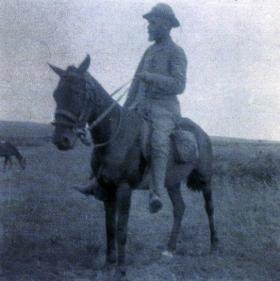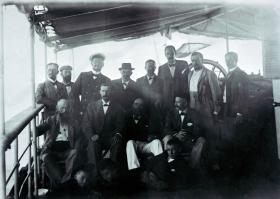‘The Mahdi for an Irish constituency or at least a seat in Dublin town council’: Davitt and Africa
Published in 18th–19th - Century History, Issue 4 (Jul/Aug 2006), News, Volume 14
Michael Davitt at a Boer military camp at Osspruit in the Orange Free State, spring 1900. (Trinity College, Dublin)
Davitt is best known for his role in Ireland, in leading the Land League and as a nationalist figure. In his day, however, he spoke and wrote about a wide range of international issues. As a journalist he frequently commented on international affairs, and his nationalism led him to criticise empires in principle, on the basis of the right of peoples to self-determination. As early as 1881, in his prison writings, he derided British involvement in the first Boer War:
‘Her last and most “brilliant” exploit in the way of civilization and “help” to liberty is her war against the Zulus and Boers of South Africa; in which shameless and unprovoked aggression England however receives from the “barbarous”, naked, assegai-armed followers of Cetchwayo [Cetewayo] (defending their country) the greatest blow alike to her prestige as a conquering nation and the vaunted courage of her soldiers, which any country has experienced in modern days at the hands of an enemy.’
Many Irish supported the British Empire and a considerable number played important roles in administering it. Yet Davitt was by no means the first Irish nationalist to criticise British policy in Africa. In the 1870s and 1880s several Home Rule MPs challenged aspects of British activities in South Africa, Egypt and the Sudan. The Irish-American organisation, Clan na Gael, even made contact with the Zulu leader, Cetewayo, to offer him assistance in the first Boer War, but the war ended before it could be delivered.
Liberal leaders had tended to oppose colonial expansion in the mid-nineteenth century. Nevertheless, it was a Liberal government that sent battleships and a military force to Egypt against an uprising led by Arabi Pasha. The force bombarded Alexandria on 11 July 1882, eventually defeating the insurgents the following September.

Davitt (centre) with fellow passengers on board Bundesrath returning to Europe from South Africa in June 1900. (Trinity College, Dublin)
When the war subsequently spread south to Sudan, where British forces fought the Sudanese leader, known as the Mahdi, Davitt was firmly on the Sudanese side. In 1885, while visiting Rome, he and his friends teased some English travellers by threatening ‘to propose the Mahdi for an Irish constituency or at least a seat in Dublin town council’. He visited Egypt that year, commenting on the large numbers of British soldiers evident in Alexandria. Later, as an MP, over a decade after the Egyptian campaign, he questioned the government’s refusal to allow Arabi Pasha and his followers to return home from exile.
As British forces penetrated into West Africa, Davitt raised questions in parliament about the mistreatment of the Ashanti king Prempeh by the British army in 1896, 1897 and 1898, and questioned the Royal Niger Company’s behaviour in Benin. His most sustained engagement with Africa came with the second Boer War (1899–1902) in South Africa. By the time it broke out on 11 October 1899 there had been a considerable build-up of public opinion in Ireland in favour of the Boers. On 1 October Davitt addressed a mass meeting in Dublin to protest against ‘the attack of England upon the liberties of Transvaal’. Three weeks later, in the most famous speech of his parliamentary career, he resigned from parliament, describing the action against the Boers as ‘the meanest war this country has ever waged against a civilised race’. Denouncing what he saw as a ‘stockbrokers’ war’, he added that although Irish opposition to the war might damage the prospect for Home Rule, liberty for Ireland should never be purchased at the price of voting against liberty in South Africa.
Four months after his resignation, Davitt travelled to South Africa as a war correspondent. He spent three months travelling through the Transvaal and Orange Free State, attended the last meeting of the Transvaal parliament, the Volksraad, on 7 May and remained in South Africa until after the fall of Pretoria. The Boer leaders, glad of his support, gave him valuable assistance, so that the dispatches he sent back to Europe were very detailed. In 1902 he published The Boer fight for freedom, an analysis of the war from a strongly pro-Boer point of view, which provided accounts of the military campaigns, interspersed with his own experiences and impressions, and accompanied by his and other photographs. His sympathy for the Boers clouded his judgement at times, however. He greatly admired the courage of the small republics in their resistance to the might of the British Empire, extolling the ‘manliness’ and stoicism of their people. But in his treatment of the Uitlander mining magnates he engaged in a measure of anti-Semitism, scoffing at the ‘fine old English gentlemen’ for whom the British Empire was going to war, whom he identified as ‘Beit, Wernher, Eckstein, Rouilot, Bernato, Adler, Lowe, Wolff, Goldmann, Neumann, and Goertz’. This is curious because in an age when overt anti-Semitism was common, in Ireland as elsewhere, Davitt on more than one occasion took a stand in defence of Jews. Even more striking is his inconsistency in his treatment of Africans. In 1898 he had asserted the rights of West Africans to govern their own country. However, in his accounts of South Africa he adopted the Boers’ racist attitudes towards the African population, describing them on several occasions as ‘savages’ and refusing to see British criticism of Boer treatment of Africans as anything more than a smokescreen for their own ambitions.
Davitt considered the Boer War to be a turning-point in Britain’s imperial prestige, alienating other Western nations by its aggression towards a small and relatively defenceless people. On witnessing the arrival of some 400 British prisoners on a train after their defeat at Sannaspos, he confided his mixed feelings to his diary: ‘A personal sympathy towards them as prisoners; a political feeling that the enemy of Ireland and of nationality was humiliated before me and that I stood in one of the few places in the world in which the power of England was weak, helpless and despised’.
Carla King lectures in Modern History at St Patrick’s College, Drumcondra.
















